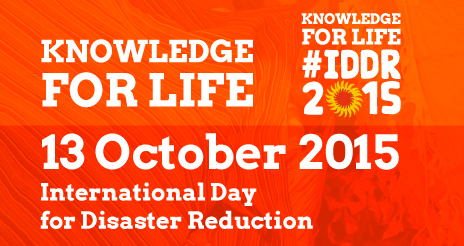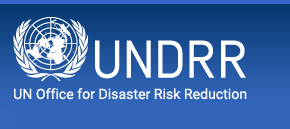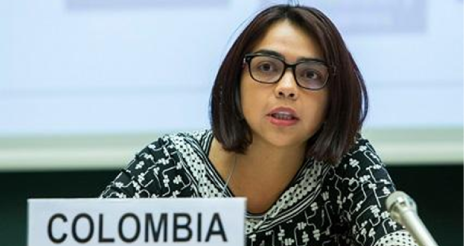- Our Mandate
- Mission and Objectives
- UNDRR in the UN
- Work Programme & Annual Reports
- Results Based System
- Work Partnerships
- Headquarters - Geneva
- SG-UN representatives for DRR
- Regional Office – The Americas and the Caribbean
- Head of the Regional Office – The Americas and the Caribbean
- What is Disaster Risk Reduction?
- What is the International Strategy?
- History of UNDRR
Financial Accounting ‘Strengthens Resilience’
By: UNDRR
GENEVA, 18 November 2014 – Financial accounting for disaster risk is an opportunity to strengthen national resilience, leaders from the public and private sector were told today.
The Assistant Director of Risk from Colombia’s Ministry of Finance and Public Credit, Ms Sandra Lucero Rodriguez Samacá, said: “We have looked at risk as an opportunity. This means we are better prepared to face disasters.”
Ms Samacá who was speaking on the closing day of the Second Preparatory Committee for the Third UN World Conference on Disaster Risk Reduction, said her country had made significant progress in the accounting of its disaster risk.
“We are now in a position to have an idea of the cost of natural hazards when they occur; we are able to quantify risk and show it in our accounts,” the Assistant Director for Risk told the Technical Session on Integrating Disaster Risk in Financing.
“By approaching the analysis of risk as an opportunity we now realize that risk is well beyond the issue of public debt and indeed affects the entire macro-economic policies of the Ministry of Finance.”
Ms Samacá said that significant progress has been made over the last ten years in including risk in the fiscal analysis of Colombia. “We have learnt that we need to work hand-in-hand with the public and private sector, including insurance companies.”
Mr Rowan Douglas, Chairman of WillisRe, said that, sadly, many cities and inhabitants in the developing world are not included in the financial system and the key challenge for resilience is to address this issue of access.
“If we could find ways of getting insurance, policies and institutions to those people this would begin driving the process of resilience,” Mr Douglas said.
“Insurance has an important role; however it is not just about insurance. It is about public and private investment accounting for disaster risk factors and discounting their capital against that risk. When private, public and mutual systems provide inclusion and access that is when communities will be served. It is when we will get progress.”
Mr Dale Sands, Senior Vice President with AECOM Technology and Global Practices and Director for the Environment, highlighted how the Disaster Resilience Scorecard – a new tool developed by AECOM, IBM and UNDRR which is based on the Ten Essentials of the Making Cities Resilient Campaign – has the potential to be a useful instrument to link financial management and disaster risk management.
The Former Chair of the UNDRR’s Private Sector Advisory Group, Mr Aris Papadopoulos, said that we are beginning to witness an effort to go beyond a focus on response and recovery and the financing of the disaster itself.
“The bigger question is how finance will help building better from the start and not just building back better. Having a more resilient world reduces the need for more ‘emergency room’ measures,” Mr Papadopoulos said.
The former CEO of Titan America said governments are reluctant to apply anything but the minimum when it comes to building codes “yet when it comes to education, health or nutrition we don’t just apply the minimum we do much more”.
“The answer for this that we mostly hear is ‘affordability’ yet this is false economics. It is not really affordable as we pay through the cost of disasters. We need to find ways to incentivize better decisions that lead to building better from beginning,” Mr Papadopoulos said.
The session concluded that the post-2015 framework for disaster risk reduction presents a clear opportunity to position disaster risk appropriately in investment decision-making and the financial system.
The Preparatory Committee ended with significant progress made in the negotiation of the text of the post-2015 framework for disaster risk reduction under co-Chairs, Ambassador Päivi Kairamo of Finland and Ambassador Thanio Thongphakdi of Thailand. Further meetings are planned before producing a second draft in January. The Zero Draft text is available at www.wcdrr.org
The post-2015 framework for disaster risk reduction will be adopted at the Third UN World Conference on Disaster Risk Reduction, which will convene in Sendai, Japan, from March 14 to 18, 2015.
Follow the UNDRR news online:
 International Day for Disaster Reduction #DIRD 2015 Knowledge for Life
International Day for Disaster Reduction #DIRD 2015 Knowledge for Life
More information

 The Assistant Director ofRisk from Colombia’s Ministry of Finance and Public Credit, Ms Sandra Lucero Rodriguez Samacá: “We have looked at risk as anopportunity, this means we are better prepared to face disasters.”
The Assistant Director ofRisk from Colombia’s Ministry of Finance and Public Credit, Ms Sandra Lucero Rodriguez Samacá: “We have looked at risk as anopportunity, this means we are better prepared to face disasters.”